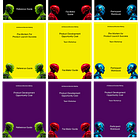Why Writing Like an AI Makes Your Content 10x More Creative
How to Think Like AI for Unstoppable Creative Writing Success
Your brain gets stuck in the same creative patterns. AIs don't. Here's how to borrow their multi-dimensional thinking for breakthrough content.
A brandable Workshop Kit is available for this article. Not yet a Coach-level Subscriber? Find out about the Workshops…
The Real Problem
You sit down to write. The blank page stares back. Your mind cycles through the same tired patterns: chronological storytelling, predictable structures, human-centered perspectives.
You're writing the way humans have always written, constrained by linear thinking, emotional biases, and the need to sound "natural." But what if those constraints are exactly what's limiting your creativity?
Every content creator faces this paradox: the more "human" your writing process, the more generic your output becomes. You follow the same thought patterns, the same narrative arcs, the same emotional progressions as everyone else.
The breakthrough comes when you learng to think like an AI, then translate those insights back into compelling human communication.
The AI Perspective Shift
AIs don't think in stories. They think in patterns, connections, and probability distributions across vast information spaces. They don't get stuck on chronological order or emotional attachment to ideas.
This creates unique advantages:
Pattern Recognition: AIs identify connections humans miss
Non-Linear Processing: Information gets assembled by relevance, not sequence
Emotional Neutrality: Ideas evaluated on merit, not personal attachment
Scale Thinking: Simultaneous consideration of multiple perspectives and outcomes
When you adopt AI-like thinking for creative work, you break free from human cognitive constraints while retaining human insight and emotional intelligence.
Quick Start AI-Perspective Prompt
Use this prompt to break out of human-centered writing patterns:
Prompt:
I want to write about [TOPIC] but avoid typical human storytelling patterns. Help me think like an AI would about this subject.
Topic: [YOUR SUBJECT]
Human audience: [WHO YOU'RE WRITING FOR]
Current approach: [HOW YOU'D NORMALLY TACKLE THIS]
Analyze this topic from an AI perspective:
1. What patterns would an AI identify that humans typically miss?
2. What non-obvious connections exist between this topic and seemingly unrelated domains?
3. If an AI had to explain this without using chronological order or emotional appeals, what structure would emerge?
4. What would an AI consider the most important elements that humans usually overlook?
Then translate these AI insights into a compelling narrative structure for human readers.This gives you AI-level pattern recognition with human-level communication skills.
Advanced AI-Enhanced Creative Framework
Prompt 1: Multi-Dimensional Pattern Analysis
Break free from single-perspective thinking by adopting AI's multi-dimensional analysis approach.
Prompt:
I'm writing about [TOPIC] and want to use AI-style multi-dimensional analysis to uncover creative angles humans miss.
Topic: [YOUR SUBJECT]
Traditional human approach: [TYPICAL WAY THIS GETS COVERED]
Target outcome: [WHAT YOU WANT TO ACHIEVE]
Analyze this topic across multiple dimensions simultaneously:
1. TEMPORAL DIMENSIONS: How does this topic behave across different time scales (minutes, years, decades)? What patterns emerge when you zoom in/out temporally?
2. SCALE DIMENSIONS: How does this topic change when viewed at molecular, individual, community, societal, and global levels? What insights emerge at each scale?
3. INVERSE RELATIONSHIPS: What happens when you flip every assumption about this topic? What would the opposite approach reveal?
4. CROSS-DOMAIN PATTERNS: What patterns from biology, physics, economics, or game theory apply to this topic in unexpected ways?
5. STAKEHOLDER MATRICES: Map every possible stakeholder (including non-obvious ones). How would each view this topic differently?
6. SYSTEM INTERACTIONS: What second and third-order effects does this topic create? What feedback loops exist?
Generate 3 creative frameworks that combine insights from multiple dimensions, then suggest how to present each framework in engaging human narrative.Sample Input: Writing about remote work productivity for startup founders
Prompt 2: Non-Linear Content Architecture
Move beyond human sequential thinking to create AI-inspired content structures.

